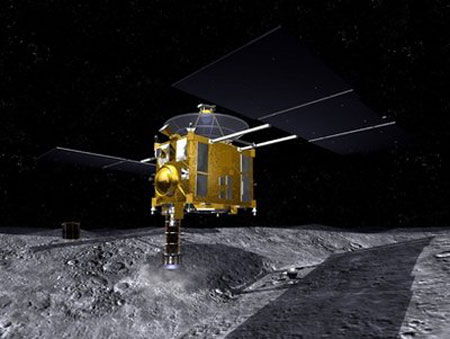The first spacecraft explores the meteorite
Japanese scientists have just flown to Australia today to recover the spacecraft that has just returned to Earth after landing on a meteorite.

Illustration of Hayabusa ship taking soil and rock samples on Itokawa meteorite.Photo: AP .
The Hayabusa spacecraft returned to earth last night after a 7-year journey of up to 6 billion km. This is the first time a spacecraft successfully landed on a meteorite and returned to Earth.
AP said two helicopters took scientists to the Hayabusa ship landing site in a military area about 485 km northwest of Adelaide. Scientists hope that the dust samples the ship brings will provide more information about the evolution of the solar system.
Seiichi Sakamoto, a scientist from the Japan Space Exploration Agency (JAEA), said that a series of technical problems caused Hayabusa's return plan to be delayed for up to three years. JAEA has launched Hayabusa since 2003 and is scheduled to return from 2007.
'Hayabusa's return journey is a huge technical challenge. We have done everything to overcome each difficulty , 'Sakamoto said.
JAEA spent $ 200 million on the Hayabusa ship building project. The aim of the project is to understand the origin and evolution of the solar system.
According to the AP, scientists will take hours to recover spacecraft and take soil samples. They will then take them to Japan for research.
Hayabusa arrived at an asteroid named Itokawa - 500 meters long - in 2005. After taking photos of meteorites from every angle, Hayabusa landed there twice.
As planned, Hayabusa had to fire a bullet into the meteorite surface to make soil, kicking a long tube. From this tube, soil and stone are sucked into a container on the ship. However, scientists are not sure that the bullet has been fired. They argue that when the tube comes into contact with the meteorite surface, the material on it still fires and enters the container. As a result, the ship still gets soil and rock samples.
Sakamoto said that all soil samples, stones from any meteorite - components that make up planets - can help people learn about the origin of the earth. Scientists hope that patterns can help them know when and how the meteorite formed, the objects it collided with, the impact of the wind and solar radiation on it.
- Japan will continue to explore
- NASA spacecraft approached the meteorite that could collide with the Earth
- Two spacecraft about to plunge into the moon to
- Japan successfully launched meteorite probes
- The American spacecraft will crash into the meteorite
- 'Fighting' with anti-meteorite 'apocalypse'
- NASA launched a meteorite research satellite that could destroy the Earth
- Find the largest meteorite pieces in Russia
- NASA completed the ship to hunt for meteors
- Flocking to find meteorite fragments in Russia
- The meteorite explosions
- NASA returned to the moon
 Van Allen's belt and evidence that the Apollo 11 mission to the Moon was myth
Van Allen's belt and evidence that the Apollo 11 mission to the Moon was myth The levels of civilization in the universe (Kardashev scale)
The levels of civilization in the universe (Kardashev scale) Today Mars, the sun and the Earth are aligned
Today Mars, the sun and the Earth are aligned The Amazon owner announced a secret plan to build a space base for thousands of people
The Amazon owner announced a secret plan to build a space base for thousands of people